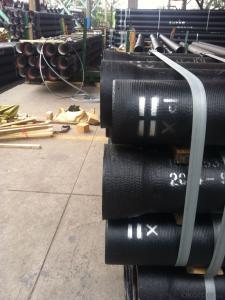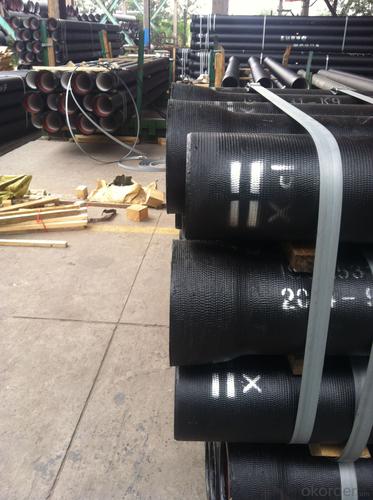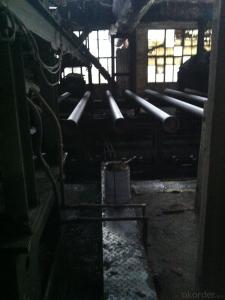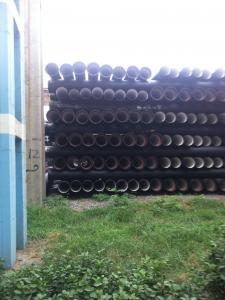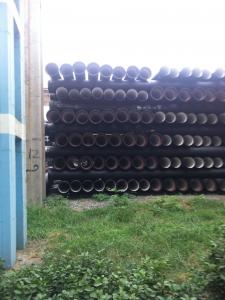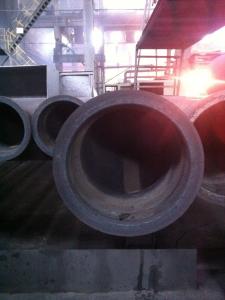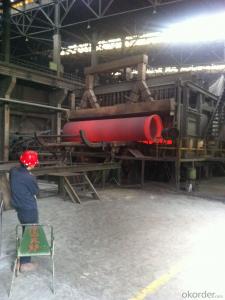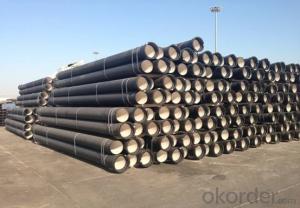DUCTILE IRON PIPES AND PIPE FITTINGS K9 CLASS DN400
- Loading Port:
- Tianjin
- Payment Terms:
- TT OR LC
- Min Order Qty:
- 22 pc
- Supply Capability:
- 3000 pc/month
OKorder Service Pledge
OKorder Financial Service
You Might Also Like
Material : Ductile Cast Iron
Size Range : DN 80mm to DN 2000mm
Unit Effective Length : 6m or 5.7m
Manufacture Standard: ISO 2531:1998/ EN 545:2006/EN 598:2007
Annual capacity : 200,000 tons
Coating Exterior: Zinc 130g/m2 according to ISO 8179-1 and bitumen coating 70 microns.
Cement Interior: Portland Cement/ High Alumina Cement/ Sulphate Resisting Cement Lining according to ISO 4179
Special requirements on external coating and internal lining can be applied
We also provide accessories such as SBR/EPDM rubber gaskets, lubricant paste, pipe caps, PE sleeves, etc.
Additional Parts:
Each pipe is strictly inspected according to related standard to ensure permanently high performance.
Easy Installation at site and service free for life
Long Service Lifespan
Quotation will arrive you within 24hours once we get your inquiry.
We guarantee offering you a competitive price.
A copy of original inspection reports of pipes will be offered after shipment.
Photos of loading process will be sent to the customer after shipment effect.
We will follow-up the delivery progress after shipment effect and update to the customer on weekly basis.
- Q: How does ductile iron pipe handle temperature changes?
- Ductile iron pipe is renowned for its effective handling of temperature changes. The exceptional properties of ductile iron give it a high resistance to thermal expansion and contraction, enabling it to endure extreme temperature variations without significant distortions or failures. When subjected to temperature changes, ductile iron pipes can expand or contract within specific limits due to their inherent ductility. This flexibility assists in accommodating thermal stresses and preventing pipe cracking or breakage. The material's remarkable tensile strength and elasticity also contribute to its capacity to manage temperature changes without substantial structural harm. Furthermore, ductile iron pipes possess a low coefficient of thermal expansion, meaning they expand and contract at a relatively gradual rate compared to other materials. This characteristic minimizes the potential for stress on pipe joints and reduces the risk of leaks or failures. In addition to its exceptional thermal stability, ductile iron pipe is equipped with a protective lining that further enhances its resistance to temperature changes. Linings such as cement mortar or polyethylene create a barrier between the pipe and the transported fluid, preventing any adverse effects caused by thermal variations on the pipe's inner surface. Overall, ductile iron pipe proves to be a dependable choice for applications where temperature changes are frequent. Its ability to withstand thermal stresses, low coefficient of thermal expansion, and protective linings make it a durable and efficient solution for various infrastructural needs, including water distribution, wastewater management, and industrial applications.
- Q: When the ductile iron pipe is pressed, the three links are always running out. What should be done?
- If the conventional backfill soil pressure, pipe fittings installed properly, the phenomenon will not appear.
- Q: Principles for the antiseptic treatment of ductile iron pipes
- The principle that the antiseptic treatment of ductile iron pipes must be complied with is that.1. internal and external surface coating shall be kept clean, remove rust and impurities2. after coating on the inside and outside surface, the coating should be even and smooth, firm and firm, and shall not be abnormal because of climate change3. coating for water delivery should be insoluble in water, no peculiar smell, harmful impurities content
- Q: What is the expected deflection range for ductile iron pipes?
- The expected deflection range for ductile iron pipes typically falls within the range of 2-5% of the pipe's diameter.
- Q: How does ductile iron pipe perform in areas with high soil erosion?
- Ductile iron pipe is renowned for its remarkable strength and durability, rendering it a dependable option for regions experiencing extensive soil erosion. With its distinctive composition, including graphite nodules, it possesses the capacity to be both pliable and resistant to fractures or cracks, even in demanding environments. Consequently, ductile iron pipe is highly capable of enduring the impact of soil erosion. In regions with high soil erosion, the surface of the pipe can potentially be scraped by soil particles, leading to abrasions or damage. However, ductile iron pipe's substantial wall thickness and corrosion-resistant coating effectively serve as a barrier against these abrasive forces. Consequently, even in regions with considerable soil erosion, ductile iron pipe can maintain its structural integrity and functionality. Additionally, the ability of ductile iron pipe to resist corrosion further augments its performance in areas with high soil erosion. Soil erosion frequently results in increased moisture content, which can expedite the corrosion process for certain materials. Nonetheless, ductile iron pipe's protective coating, typically composed of zinc or epoxy, acts as a shield against corrosion, ensuring prolonged performance and reliability. To summarize, ductile iron pipe exhibits exceptional performance in regions with high soil erosion due to its strength, flexibility, and resistance to fractures or cracks. Its substantial wall thickness and corrosion-resistant coating make it highly durable against abrasive forces and corrosion, enabling it to withstand the challenges posed by soil erosion. Consequently, ductile iron pipe is a dependable choice for infrastructure projects in these areas, offering long-lasting and efficient water and wastewater transportation systems.
- Q: How does ductile iron pipe perform in areas with high groundwater contamination?
- Ductile iron pipe performs well in areas with high groundwater contamination due to its corrosion-resistant properties. It can withstand the corrosive effects of contaminated water and maintain its structural integrity over time, making it a reliable choice for such environments.
- Q: Ductile iron pipes lined with cement mortar in the water (living water, water in the 6.9-7.3) in the early pH, why pH increased? How to solve this problem?
- 1, because of the bone in mortar, such as silicate products, there will be silicification reaction, in addition, there is the reaction of limestone in lime.2, cement mortar lining cover coating, that is, spray some paint! Some questions four are unavoidable
- Q: How is ductile iron pipe protected against external corrosion?
- Ductile iron pipe is protected against external corrosion through a process called external coating. This involves applying a layer of protective coating, such as asphaltic or epoxy, on the outside surface of the pipe. The coating acts as a barrier, preventing moisture and corrosive substances from coming into contact with the iron, thus reducing the risk of corrosion. Additionally, cathodic protection methods, such as applying sacrificial anodes or using impressed current systems, may be employed to further enhance the corrosion resistance of the ductile iron pipe.
- Q: Is there any cast iron pipe used in the fire hose?
- I don't know, I only know that the fire pipes produced by our company is the base tube is a pipe, and then coated with a corrosion and non-toxic, long service life, we are Suzhou Yuyao Pipe Industry Co. Ltd. is a professional production of the manufacturers, oh
- Q: What are the different types of joints available for ductile iron pipe?
- There are several types of joints available for ductile iron pipe, each offering different benefits and suitable for different applications. Here are some of the most common types: 1. Mechanical Joints: These joints use a mechanical joint gland and rubber gasket to create a watertight seal. They are easy to install and allow for quick and simple disassembly if needed. 2. Push-on Joints: This type of joint features a rubber gasket that is compressed when the pipe is pushed into the fitting. It provides a reliable seal and requires no special tools for installation. 3. Restrained Joints: Restrained joints are designed to withstand higher internal pressures and prevent the pipe from pulling apart. They typically use a combination of mechanical or push-on joints with additional restraints such as thrust blocks or harnesses. 4. Flanged Joints: Flanged joints use flanges and bolts to connect two pipes together. They are commonly used in situations where frequent disassembly is required or when connecting to other types of pipes or equipment. 5. Welded Joints: In some cases, ductile iron pipes can be welded together to create a strong and permanent connection. Welded joints are typically used in large diameter pipes or specialized applications where a high level of strength is required. It is important to consider factors such as the pipe's application, pressure rating, and installation requirements when selecting the appropriate joint type for ductile iron pipes.
Send your message to us
DUCTILE IRON PIPES AND PIPE FITTINGS K9 CLASS DN400
- Loading Port:
- Tianjin
- Payment Terms:
- TT OR LC
- Min Order Qty:
- 22 pc
- Supply Capability:
- 3000 pc/month
OKorder Service Pledge
OKorder Financial Service
Similar products
Hot products
Hot Searches
Related keywords
